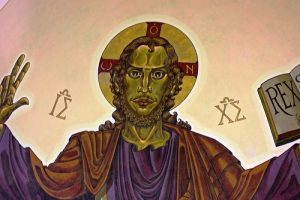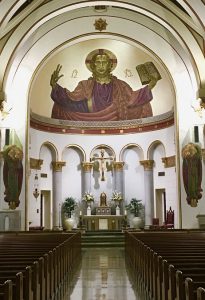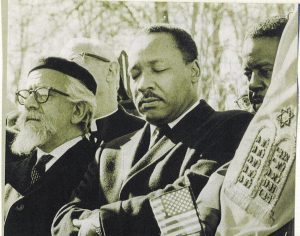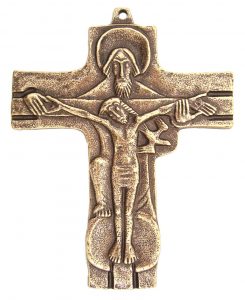A true image of God
 [lines 1-2 of the map]
[lines 1-2 of the map]
You have said Yes to the Lord’s call to own for yourself the spirituality of the Brothers of the Sacred Heart. Now that you’ve considered prayerfully your motives and possibilities and made a free decision to make this inner voyage, your next decisions are about what to take with you on the ship and what to leave behind. Remember Brother Ambrose, who brought seeds for the farm in Dubuque and packed them with his belongings in a wooden box he made for himself.
Since this is a voyage of transcendence (remember Maslow) and not of geography, Ambrose’s luggage is a metaphor for spiritual options we need to make. Implicit in his choice to bring a trunk full of seeds is a belief that God is the sower, the sender of manna, who “satisfies the desires of every living thing: “The eyes of all look to You, and You give them their food in season.”[1]
The Dubuque group, in hauling chapel furnishings half way across the world, shows its belief that God is a close presence—“Wherever two or more of you gather in my name, there I am in your midst.” The most important thing the Basutoland brothers packed was their Commonwealth passport, but it didn’t save them; it complicated their life. They came to believe that God and not their country is redeemer and liberator.
Sherry Weddell, who does pastoral formation and research for the dioceses in Colorado, was in for a surprise after one of her national surveys. Huge numbers–29%–of Catholics responded that they do not believe in a personal God. True, they believe in an eternal God who is universal creator and source of power, but only 48% said they have a relationship with the God whose existence they accept.[2]
Through prayer and reflection, our final preparations involve cultivating faith in a God whose image is in keeping with the vision of Brother Maurice. We’ve read his map, but now is the time to reflect on it with wisdom so that we can leave on the wharf any defective default images of God that encumber us.
We can bring with us only one image: God is love. Brother Maurice, who led the editorial commission charged with revising the first chapter of the Rule of Life, specifically insisted that it begin with the verse from the first letter of John, “God is love.” By enshrining those three words as the keystone of the Rule, he wanted to dethrone all other images of God that might reign on pedestals in our heart. God is personally involved in our lives in a relationship incarnated in Jesus and given life today in our relationships with others.
The Crown Jewel
From the vast treasurehouse that is the Bible, Maurice wants us to pack among our most prized possessions the full text of 1 John 4: 7-21. This passage supplies the rich full context of the first three words of our map.
Beloved, let us love one another, because love is of God;
everyone who loves is begotten by God and knows God.
Whoever is without love does not know God, for God is love.
In this way the love of God was revealed to us: God sent his only Son into the world so that we might have life through him.
In this is love: not that we have loved God, but that the Father loved us and sent his Son as expiation for our sins.
Beloved, if God so loved us, we also must love one another.
No one has ever seen God. Yet, if we love one another, God remains in us, and his love is brought to perfection in us.
This is how we know that we remain in him and he in us, that he has given us of his Spirit.
Moreover, we have seen and testify that the Father sent his Son as savior of the world.
When we acknowledge that Jesus is the Son of God, God remains in us and us in God. We have come to know and to believe in the love God has for us.
God is love, and when we remain in love we remain in God and God in us. In this is love brought to fullness among us, that we have confidence on the Day of Judgment because as he is, so are we in this world.
There is no fear in love, but perfect love drives out fear because fear has to do with punishment, and so when we fear we are not yet perfect in love.
We love because God first loved us.
If we say, ‘I love God,’ but hate our brother or sister, we are liars; for if we do not love a sister or brother whom we have seen, we cannot love God whom we have not seen.
This the commandment we have from him: if we love God we must also love our brothers and sisters.
In Maurice’s mind, this passage is the crown jewel of divine revelation. It opens by addressing us as Beloved–God’s only image of us. The whole passage is meant to feed us with daily inspiration. It is the most prized of the contents of the “Ambrose box” we bring with us to sustain us during our spiritual journey. Its verses are the seeds the brothers were sent to plant and till in the hearts of the orphan boys of Mobile.
Distorted images
To follow our map means leaving behind any distorted images of God we may have imagined or learned. Those are idols of our own creation or of catechetical malpractice. I grew up in a Catholic school—named Sacred Heart, no less. We often went to Mass and confession at the parish church across the street. Here is a photo of the giant image in the dome above the main altar:
 It is an image of God I later wanted to unlearn: an all-seeing judge with an imperial stare who communicates in Latin and Greek and whose body language screams “don’t mess with me.” For added emphasis, the image is flanked by two twenty-foot tall angels of similar mien whose hair rises in flames. Later in life, it helped me to learn that the artist, German Benedictine monk Dom Dewitt, who was called in to decorate the church shortly after World War II, was evoking God’s wrath at the holocaust.
It is an image of God I later wanted to unlearn: an all-seeing judge with an imperial stare who communicates in Latin and Greek and whose body language screams “don’t mess with me.” For added emphasis, the image is flanked by two twenty-foot tall angels of similar mien whose hair rises in flames. Later in life, it helped me to learn that the artist, German Benedictine monk Dom Dewitt, who was called in to decorate the church shortly after World War II, was evoking God’s wrath at the holocaust.
Many otherwise good Catholic educators have not been allergic to using God’s wrath as a threat against bad attitude. There is a joke that re-circulates every generation or so in Catholic schools. A recent version of it goes something like this: A thirteen year old boy whose family emigrated from India was having difficulty with mathematics; he failed it in public school. His parents were not religious, but after pondering a friend’s suggestion, they felt that a Catholic school could be more effective. After the switch, his grades began to rise dramatically. Asked by his Indian uncle what had helped him so much, he said, “When I looked up and saw the guy nailed to the plus sign, I knew they meant business!”
The Indian boy’s misunderstanding of the crucifix is only a faint echo of a strain of theological theories that interpret Jesus’ death as a kind of ransom which the Father, enraged by human atrocities, demanded as a condition for saving us.[3]
The belief that the Father willed the Son’s death is a horrible caricature which gives lie to John’s image of God as love. The fact that the Son died and not the Father does not mean that one God sent another, but that the one God descended in love to suffer and die for us.[4] Pope Benedict XVI corrected the ransom theory: God comes to live among us and die with us to reveal just how much he loves us. On the cross God–Father, Son, Spirit–suffers the results of the human choice of sin, making the ultimate sacrifice. For Benedict, the crucifixion is” the expression of that foolish love of God’s that gives itself away to the point of humiliation.”[5] It shows us that God loves and respects the free will of all creatures to the point of dying on a cross.
While we are in port at Le Havre, our spiritual struggle is to make an intentional choice to leave distorted images of God on the wharf. They are encumbrances. With our baggage in front of us, we pray for the insight to follow Ambrose’s example, taking with us only the most valuable and inspirational one: the image of God-who-is-all-heart, suffering with us and for us, and enduring the pains of birth required for us to transcend ourselves.
5
Le Havre—A True Image of God
Prayer, Reflection, and Exchange
The grace I seek …
The first line of Brother Maurice’s map calls to mind the desire of Andre Coindre, who reveals his image of God in one of his his sermons, “The Greatness and Love of God.”
If I could speak with each of you personally
so that you could recount to me
the prodigies of compassion
which you have received,
we would never grow weary
of admiring together and praising
the inexhaustible tenderness of the God of love. [6]
I call on Andre’s intercession to help me recall the prodigies of God’s love in my past life.
Hymn From Matthew 11:28-30 The Lord uses images to describe his image of himself.
Image of God in our Culture
As an American, I am influenced by the image of God that surrounds me. Review some research about America’s images of God. How do I feel about the findings? Where do I find myself among them?https://www.faithandleadership.com/how-americans-view-god
Review of God in my Life
We come to know God by reflecting on experiences and learnings that may have revealed God to us.
ONGOING PROCESS Getting to know God is an on-going process. There is always more we can know. We tell our story over and over again until we get it right.
UNIQUE RELATIONSHIP Each of has a unique relationship with God. God enters our life in a way suited to our particular personality, culture, and faith. Getting to know God is like getting to know any person: we first feel a desire to know God and then work at it with time, energy, and effort. It is a kind of discernment.
YOUTHFUL IMAGES OF GOD As we grow older and God enters our life, our images of God change. Our perception of God is corrected.
When we were younger, our images of God were based on our vulnerability and our limited experiences. Often when we think we have lost faith, it’s just that our childish ideas of God had to fall by the wayside.
Here are some images of God we may possibly have held or still hold. These are images of God that have brought us to where we are today in our faith life. As we read over them we reflect on experiences and persons that have helped us move beyond these images to an adult relationship with God.
- A police officer God – watches everything we do to make sure we don’t get out of line. If we do, God sees to it that we admit our guilt and receive punishment.
- An accountant God – the person with the big book who keeps track of all the good and bad things we do. In the end, God totals the two columns and if the good total is more than the bad, we are admitted to heaven.
- The Santa Claus God – we make out a list of all the things we want and give it to God in prayer. God will see to it that we get everything we want. Also called the “gimme-god.”
- The Aspirin God – whenever things go wrong, we run to God, expecting comfort and a cure for our ills. God is there to make everything right as quickly as possible.
- The Mountaintop God – God’s all alone on top of the mountain and has better things to worry about than us. God is transcendent and mysterious. We expect no interaction, just fear and respect.
- The Catechism God – God has the pat answers to all the questions; involvement with God demands no thought or personal commitment. God makes rules, we follow them. We just repeat formulas and rituals.
- The Stained-Glass God – God is a beautiful image whom we discover only in church or in sacred “God-ray” moments that transport or intrigue us.
- Some of us may live with a blank or hazy image of God.
Because we have always accepted them as true, some of our youthful images of God are never left behind. We can spend so much of our lives with these youthful images that they become assumptions that dominate or distort our relationship with God. But most of us reach a time when our adult life experience or professional formation critiques them, showing them to be unreliable or inadequate. Our adult freedom enables us to move beyond them to more mature images of God.
Reflect on times of transition when you set aside a too-facile or distorted image of God that had been passed on to you.
Finding a Personal God
A key to outliving immature images of God is the discovery that God is active and present all around us. We will find God if only we look into our life experiences. Take time to reflect on ways God may have been personally present to you in your everyday life.
- NATURE and CULTURE Recall times of finding God through nature or through art, literature, music, or creative pursuits.
- OTHER PEOPLE Think of persons who demonstrate Christ-like qualities or whose image of God have captivated you. Often by studying what God means to other people or by studying people who have Christian qualities, we can come to know Jesus. Every person is made in the image of God and therefore reflects God. Here are some examples:
— the faith of parent or friend whose belief might have inspired us. No one person is totally like Jesus. But every person has at least some Christ-like qualities. Other peoples’ faith can challenge or complete our image of God.
— others who have embodied God for us by forgiving us, caring for us, listening to us, calling us out of loneliness.
- SCRIPTURE Jesus is the definitive image of God. The scriptures record Jesus’ life and values; they give his message. They challenge each of us to re-evaluate our image of God, often an image made in our own likeness. In the gospels Jesus tells us who God is, who we are, and what God hopes from us. Knowing and living the gospels is a way to know Jesus and make our own the images Jesus uses to tell us who God is.
— Pick out a Scripture passage that has come to be important to your image of God. Recall the passage and how it came to mean something to you. How does it describe your understanding of God?
- PRAYER Prayer is interaction –“you and me talk” – with God. It can include talking with God about what is going on in our minds and hearts and then listening for God’s response. It can also be more formal written prayers you may have collected to which you turn to express your desires and aspirations. It may be a simple acknowledgement of God’s presence with us. St. Ignatius developed a whole new way to pray for busy people who cannot be monks. Basically he taught people how to “find God in all things.” He placed great importance on meeting the Lord through relationships with others, in difficult situations as well as in our joys, on the phone, in the car, walking down the hall, at work, while running, waiting, studying or enjoying precious leisure.
— Recall times when you experienced meaningful prayer related to your feelings, life-choices, or struggles. How would you describe the results of your prayer?
Discovering God in ourselves
As our relationship with God grows in strength and depth, we begin to discern God in ourselves.
- SELF AS GIFT The more aware we are of our gifts and the more we experience our own goodness, the more we will see ourselves as a beautiful gift of God to others. Think of a personal example where you see yourself as a gift of God.
- GOD IS WITH ME God is close to us as our Father and Mother. I am a son or daughter of God. St. Ignatius said of himself: “God is with me and would have created the whole universe just for me! Jesus would have died, just for me!” Recall times when you experienced God with you.
- GOD LOVES ME I am unrepeatable and unique. God loves me just the way I am – not in spite of my weaknesses and failures, but with them. God loves me, even when I cannot love myself! God forgives me even when I have trouble forgiving myself.
— Think of a time when you came to understand that God loved you even though you had trouble loving yourself. Who helped you reach that realization?
Becoming an instrument of God’s Love
Reflect on personal experiences of being an instrument or an extension of God’s love to others, particularly children, parents, or friends.
Father Andre Coindre’s Image of God
Excerpts from Preaching Notes of Father André Coindre, 45
The Greatness of the Love of God
Yes, in creating you, God loved you as a father,
so you could enjoy the sensation of living,
so you could surge forth
from the nothingness of eternal silence,
out of murky vagueness and into light.
In deciding to create you, God loved you as a father.
No, I say he loved you as more than a father,
because the love of a father begins
only at the instant of birth.
God’s love began eternally long before that
without the slightest interruption,
without a moment of indifference.
God has loved you constantly in the mystery of eternity.
You began in his mind’s eye a century of centuries
before you were born.
You began in his heart of hearts before there was time.
It was his dream to place you among his chosen ones,
in his holy nation.
Before the world was born, faithfully, eagerly,
God had in mind to give you the grace of holiness,
of wholeness,
so you would walk in his presence alive with his love.
In deciding to create you, God loved you as a father.
No, I say it again, as more than a father.
A father’s love is mixed with self-interest and duty.
God’s is free, gratuitous.
He loves you tenderly, pure and simple.
In deciding to create you, God loved you as a father…
as more than a father,
because as tender as a father’s love is,
he does not choose his children.
But God loved you with the love of choice,
with preferential love.
He preferred you. He wanted you in particular.
I am not talking about all the ways he has spoiled you and favored you, sparing you from harsh climates and disasters which so many endure, saving you from persecution, suffering, and death.
I am talking about the grace of God’s choice
to create you in preference to millions of others
he could have created,to desire you instead of the hundreds, even thousands of worlds and beings which could have fired his love, and which could have responded more generously than you,
but which, compared to you,
will forever remain
uncreated, in eternal neglect.
Have you ever realized that your heart
was created in the place of so many hearts
which might have been much holier,
much more ardent in returning God’s love?
And yet, your heart, as simple and as small, as narrow
as you might feel it to be: God prefers it to all those others.
Never, ever doubt the love in the heart of God for you.
Could he have put into the heart of your father
or into the heart of yours friends who love you dearly
a feeling that he did not first have in his own heart?
Could the tender heart of your mother have showered on you
such love and caring all day and all night
during your infancy without God’s first giving her
the energy of his restless love?
Admit it and proclaim it, then: God is more than your father. He is a father deeply in love with you. compared to him all fathers and mothers are only a reflection, a shadow. He is a father whose heart is a roaring hearth, an intense fire. He is a father whose love makes the most loving and dedicated persons you might know or imagine seem like nothing more than the faintest spark. Admit his love, proclaim it. And pray with me:
I make the prayer of Andre Coindre my own
My God, despite my pettiness, my sinfulness, you love me. The goodness, the gentleness of your love is too good to be believed too easily. How is it that you love such inconstant, such small creatures as us? Are you forgetting that only goodness and beauty are worthy of such love? At least that’s how we are. We love only what is good, or at least only what seems good to our limited and sinful affections. We reject what is ugly and unpleasant. But you who see everything, whose gaze penetrates into our darkest selves, into the hardest parts of our hearts, you love us. You love us with our refusals and selfishness, with our vices and addictions. You love us while we are sinners! My God, how sublime and mysterious! I have come to take your love for granted. I have come to count on your love. I have come to expect you to love me even in my most outrageous moments of insult and vengeance.
O incomprehensible love, how can I keep speaking about your love unless you pour into my heart great tongues of fire? How can I speak another word unless you gather up and fill me with the love in the hearts of all mothers who ever existed, of all the saints who have ever loved, of all the angels who adore you. Give me the grace to love in return, to respond worthily to your heart forever open and forever full. Through Christ our Lord. AMEN.
The Heart of God known to the Prophets

God is turned towards humanity and has feelings toward humanity. God is dependent on the human voice of prophets to express those feelings. Prophecy is the voice that God has put into certain individuals to express silent agony, a voice to the plundered poor, to the profane riches of the world. Prophecy is a form of living, a crossing point of God and man. God is emoting in the prophet’s words. — Abraham Joshua Heschel, The Prophets Ch. 1
Divine pathos refers to Heschel’s daring suggestion that God Himself is capable of emotion, is in fact more emotionally sensitive than human beings. In Heschel’s words, “God is moved and affected by what happens in the world, and reacts accordingly.” Prophetic sympathy in Heschel’s sense is human sharing in the emotions of God, as exemplified preeminently by the prophets of Israel. “The prophet,” he says, “is guided not by what he feels, but by what God feels.”
To Jews and Christians it should hardly be news that God is capable of emotion. Does not the Bible speak constantly of God’s chesed, or loving kindness? And is not love an emotion? For that matter, the Bible speaks not only of God’s love, but also of his wrath, his rejoicing, and even pain. Though the phrase “divine pathos” is original with Heschel, he would be the last to claim to have invented what it stands for. On the contrary, it is one of the Bible’s main themes. Yet the fact is that many if not most religious thinkers have been embarrassed by the thought of God’s emotional involvement.
God forever wanted to become emotionally involved in human history, with all the heartache that would entail. The philosopher would forbid it as unbecoming a deity. It is thus clear who is calling the tune: The philosopher’s god is a prisoner, the victim of restrictions imposed by human speculation. The biblical God, by contrast, “does whatever he pleases,” as the psalmist says. God’s response to the philosopher’s approach is, “My ways are not your ways, and my thoughts are not your thoughts. Maybe if you were God, you would never choose to identify with humankind, to share their joys and sufferings. Yet that is my choice.”
The prophet is someone whose emotions are in tune with God’s. “To be a prophet,” says Heschel, “means to identify one’s concern with the concern of God.” This emotional oneness is the Bible’s distinctive kind of religious experience. God does not swallow up the prophet but enables the prophet to vibrate with divine feelings. The Heart of God [7]
Browse the Scriptures to discover how God suffers in three ways.
1. God suffers because the chosen people reject him.
God is accused by the people and, despite being innocent, is deeply moved, responding by using expressions of lamentation and bemoaning the rupture of the close relationship with dear ones.
Heart of a father/ of a mother Isaiah 1: 2-4
It is important to note that God’s grievances aren’t motivated by Israel’s disobedience of the law, but by the rupture of the father-son [mother-child] relationship. It is impossible in this context to not think of the parable of the prodigal son in the New Testament. (158)
Heart of a spouse
The goal of these complaints coming from the afflicted heart of God is always to lead the chosen people to a conversion of heart. (159)
Jeremiah 2 : verses 2 and 12
Jeremiah chapters 29-31
2. God suffers with the people who suffer.
Isaiah 54: 7-8 God shares the sufferings of his people.
God in mourning: In the prophets we find the language of mourning and of compassion. God expresses suffering directly, using a great variety of very human expressions of grief.
Jer 48: 30-36
Jer 9: 16-17
Jer 31: 20 In verse 15 of this chapter, Rachel, the mother of Israel, weeps for her children. But in verse 20, it is God who assumes the maternal role in her place. In the manner of Rachel, God remembers his[her] children and cries over what they are suffering.
Through the prophets, God expresses anguish over:
Twelve cities attacked: Micah 1: 8
Fights among the powerful: Is 21: 2-4
Famine: Jeremiah. 8: 18-23
3. God suffers labor pains to bring us to new birth.
Because Israel is sterile, it is unable to give itself new life. Rebirth can only come from God, the only creator, the only one capable of giving life to a new creature. The period between the death and the birth of the chosen people is for God a time of intense sorrow, which finally flowers into a new creation.
Hosea 11: 8-9
Isaiah 42: 14-16
The new life is not given as a result of human supplications or intercessions. It can only be explained by the gratuitous love of God.
Isaiah 49: 15-16a
Too Good to be True
Wonder at the message of The Song of Songs.
Read and savor Chapter 1 of this remarkable poem of God’s love.
http://www.usccb.org/bible/songofsongs/1

Dwell with the poetic imagery of God as a lover and ourselves as beloved. Savor the remarkable images of God’s love in the sermons of Saint Bernard of Clairvaux:
https://livingchurch.org/covenant/2016/08/20/the-honey-sweet-doctor/
Utterance of the Father to Jesus on the Cross[8]
I did not forsake you eternally,
but was aching beside you in your heart.
(J. Moltmann)
Cursed like Adam,
my firstborn, my image,
my son, a worm,
a serpent, belly in the dirt
My son, my image!
I watch the sweat of his brow
darken from the thorns of the curse.
Gen 3:4-19
Cursed like Ishmael-
son of Abraham,
my boy, my son, a slave,
an outcast exposed to the noonday sun.
My son, my image!
I hear him thirst
I watch him die from the curse. Gen 21: 8-16
Cursed like Absalom,
son of David,
my son, hanging, a prey, 2 Sam 18: 9-18
a corpse pierced through to save me
My son, my image!
I watch the words form:
“My God, my God, …why?”
I curse the curse. I quiver. I hide my face.
I weep. I cry.
My son! My beloved! My son!
My son!
O that I had died in place of you.
My son!
I cover my face. My son!
I wail.
My beloved son!
My son! My Son!
My blessed! 2 Sam 19: 1-5
How God Loves Us Music Clip How He Loves Us
Anthony Evans proclaims his image of God in a powerful witness
[A song of David Crowder (15 minutes)]
Lyrics:
He is jealous for me, Loves like a hurricane, I am a tree,
Bending beneath the weight of his wind and mercy.
When all of a sudden, I am unaware of these afflictions eclipsed by glory,
And how great Your affections are for me.
Oh how He loves us,
How He loves us all
Bending beneath the weight of his wind and mercy.
When all of a sudden, I am unaware of these afflictions eclipsed by glory,
And I realize just how beautiful You are,
And how great Your affections are for me.
Oh how He loves us,
How He loves us all
Oh how He loves us,
Oh how He loves us,
Oh how He loves.
Drawn to redemption by the grace in His eyes,
If His grace is an ocean, we’re all sinking.
And heaven meets earth like an unforeseen kiss,
And my heart turns violently inside of my chest,
I don’t have time to maintain these regrets,
When I think about, the way
Oh how He loves us,
Oh how He loves us,
Oh how He loves.
Yeah, He loves us,
Oh how He loves us,
Oh how He loves us,
Oh how He loves.
Listening and Mutual Support
We listen and talk about what changeswe’ve gone through in our image of God, what experiences of the love of God have marked our life, and about scriptural images showing that God is love.
Footnotes
[1] Psalm 145
[2] Sherry Weddell, Forming Intentional Disciples (OSV publications, 2012)
[3] Joseph Moloney, “Catholic Soteriology – Ransom Theory”
[4] Gerald O’Collins, Redemption as Transforming Love, in Moloney
[5] Cardinal Joseph Ratzinger, Introduction to Christianity, in Moloney
[6] Preaching Notes, p. 272-273
[7] R. Fretheim, Il Dio Compromesso, (Edizioni Paoline ,1987):, chapters 7-9.
[8] Brother Bernard Couvillion, SC, The Option for Compassion, 2002


